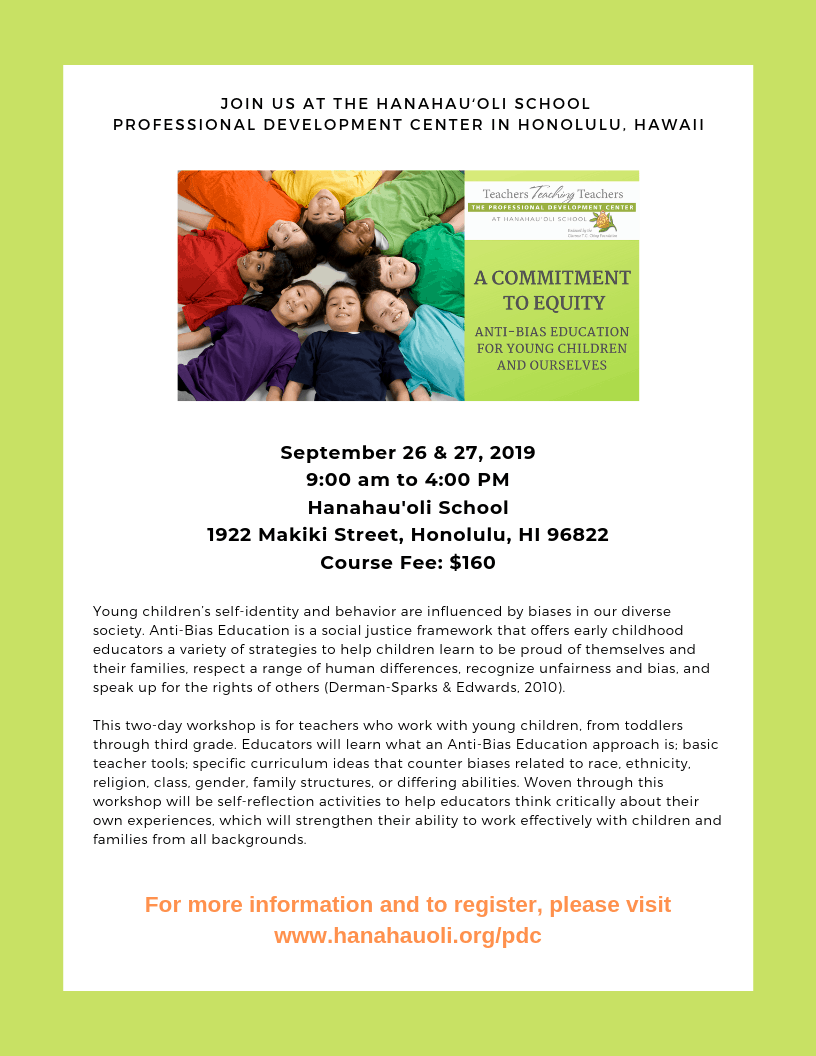A Commitment to Equity: Anti-Bias Education for Young Children and Ourselves
Thursday, September 26 & Friday, September 27, 2019
9:00 am to 4:00 pm
At the Hanahau’oli School Professional Development Center
Young children’s self-identity and behavior are influenced by biases in our diverse society. Anti-Bias Education is a social justice framework that offers early childhood educators a variety of strategies to help children learn to be proud of themselves and their families, respect a range of human differences, recognize unfairness and bias, and speak up for the rights of others (Derman-Sparks & Edwards, 2010).
This two-day workshop is for teachers who work with young children, from toddlers through third grade. Educators will learn what an Anti-Bias Education approach is; basic teacher tools; specific curriculum ideas that counter biases related to race, ethnicity, religion, class, gender, family structures, or differing abilities. Woven through this workshop will be self-reflection activities to help educators think critically about their own experiences, which will strengthen their ability to work effectively with children and families from all backgrounds.
$160 Registration Fee includes book: Anti-Bias Education: For Young Children and Ourselves by Louise Derman-Sparks and Julie Olsen Edwards.
Workshop Objectives:
Participants will be able to:
Learn what is an anti-bias education and the four goals of anti-bias education
Review the historical and empirical support for anti-bias education
Appreciate how young children develop their social identities
Identify how to become an anti-bias teacher and work effectively with children and families from all backgrounds
Understand how to establish an anti-bias environment and curriculum
Discover specific curriculum ideas for various anti-bias topics, including culture, racial identity, gender identity, economic class, family structures, and different abilities
Learn how to sustain an anti-bias education approach beyond this workshop.
Workshop Agenda:
Day One
8:15-8:45 Sign In
9:00-9:15 Welcome & Introductions
9:15-10:30 What is Anti-Bias Education? Historical and Empirical Support of Anti-Bias Education
10:30-10:40 Break
10:40-11:15 How Young Children Develop Their Social Identities
11:15-12:00 Becoming an Anti-Bias Educator
12:00-1: 00 Lunch
1:00-1:45 Becoming an Anti-Bias Educator
1:45-2:30 Creating an Anti-Bias Environment
2:30-2:40 Break
2:40-3:40 Establishing an Anti-Bias Learning Curriculum
3:40-3:50 Preparing for Tomorrow’s Agenda
3:50-4: 00 Closing
Day Two
8:15-8:45 Sign In
9:00-10:15 Learning about Culture, Language, and Fairness
10:15-10:25 Break
10:25-11:15 Learning about Racial Identity & Fairness
11:15-12:00 Learning about Gender Identity and Fairness
12:00-1: 00 Lunch
1:00-1:45 Learning about Economic Class and Fairness
1:45-2:30 Learning about Family Structures and Fairness
2:30-2:40 Break
2:40-3:30 Learning about Different Abilities and Fairness
3:30-3:55 How to Sustain an Anti-Bias Teaching Approach
3:55-4: 00 Closing
About the Presenter:
Dr. Terry Lock has spent over forty-three years in the field of early childhood education (ECE), teaching children, parents, and college students; administering county and state programs; developing public policies; and working as a consultant to various organizations. In the 1970’s, while working on her master’s degree at Pacific Oaks College in CA, she was mentored by Louise Derman-Sparks, an internationally respected anti-bias educator and the co-author of Anti-Bias Education. Dr. Lock received her Education Doctorate in Educational Professional Practice (Ed.D.) from the University of Hawaiʻi at Mānoa College of Education, where she currently teaches undergraduate and graduate ECE courses. Her research interests are social justice in education, playful learning, preschool through third grade alignment, pedagogical leadership, and early childhood workforce development. Dr. Lock and her husband, Stephen, have three adult children and five grandchildren.
